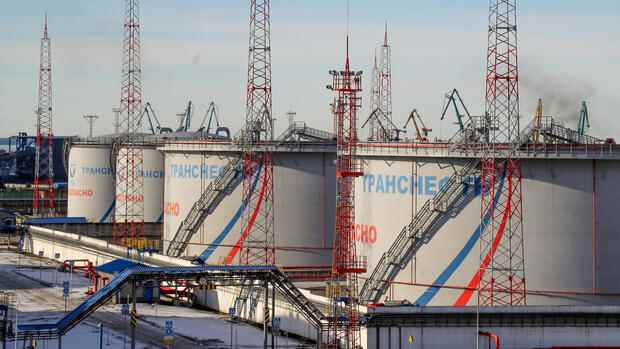The sea transport of crude oil and petroleum products of Russian origin should only be possible worldwide if the oil was bought below a certain price.
(Photo: dpa)
Zurich, Berlin, Brussels The G7 countries want to push through a global price cap on Russian oil. In a joint statement on Friday, the economically strong democracies called on all importers of Russian oil to follow this measure. Federal Finance Minister Christian Lindner (FDP) spoke of forging the largest possible “coalition”. Germany holds the G7 presidency this year.
Russia is currently making high profits from oil exports, said Lindner: “We don’t want Russia to continue to benefit from these sales.” At the same time, the rise in energy prices on the global markets should be dampened. Russia’s war is a global threat to energy supply, explains Lindner.
According to the Finance Minister, the G7 countries want to make changes to the previous sanctions to enforce the price cap. The EU has sanctioned certain services related to Russian energy exports, such as insurance for ships transporting oil.
There could be exceptions to this in the future – but only if the transported oil is bought for a price below the set limit, Lindner explained the idea. Discussions would still have to be held on the “technical, practical details”.
Top jobs of the day
Find the best jobs now and
be notified by email.
The G7 themselves undertake to implement the price cap quickly in their own countries. The finance ministers of the G7 did not initially commit themselves to an exact upper limit. The cover should be communicated transparently and its effect closely monitored.
Price cap should take effect at the turn of the year
Welcoming the decision, US Treasury Secretary Janet Yellen said: “Today’s action will help deal a serious blow to Russia’s finances.” accelerate”.
In early summer, the US government tried to dissuade the Europeans from a boycott.
(Photo: AP)
The question is, however, what a price cap agreed in the G7 circle will bring. In the spring, the USA decided to ban imports of Russian oil. The EU, which has so far imported considerably more oil from Russia than America, also managed to boycott it a few months later. It should come into force at the turn of the year. Only then, according to the G7 resolution, should the price cap take effect.
A buyer cartel requires purchasing power. It remains unclear how the G7 want to dictate prices to the Russians if they buy little or no Russian oil. A price cap would have made sense above all as an alternative to a boycott: if the Europeans had continued to import oil from Russia, it would have been easier to enforce price reductions thanks to their own market power.
Making it difficult to transport Russian oil
In early summer, the US government tried to dissuade the Europeans from a boycott. At the time, Finance Minister Yellen proposed a “price mechanism” to prevent “price jumps”.
The high fuel prices in the USA are a serious problem for the government in Washington. Congressional elections are coming up in the fall. US President Joe Biden’s Democrats are at risk of losing their majority in the House of Representatives and possibly also in the Senate.
>> Read here: Biden’s Comeback – Why the US President is catching up in polls
The G7 must now rely on making the transport of Russian oil more difficult. In essence, this is intended to force Russia to sell oil to large buyers such as India at a significantly lower price in the future.
A possible lever are important services such as insurance for oil transport. These are largely in Western hands. However, Russia has recently significantly increased its exports to countries such as India and China, despite Western sanctions.
Nevertheless, the G7 hope that it will be possible to relax the global oil markets and cushion the effects of the Ukraine war on energy prices. In the next step, EU Commission President Ursula von der Leyen also wants to cap the price of natural gas that flows to Europe via pipelines. She was “deeply convinced” that the time had come for this step, said the CDU politician at a meeting of the Union faction leaders in Murnau.
In the next step, EU Commission President Ursula von der Leyen also wants to cap the price of natural gas that flows to Europe via pipelines.
(Photo: dpa)
The idea has been discussed in Brussels for some time, but the federal government has so far resisted it. She did not want to give Russia an excuse to cut off gas supplies. Most recently, however, the Russian energy company Gazprom had drastically reduced gas exports to Germany.
More: Read all current developments in the energy crisis in the news blog
